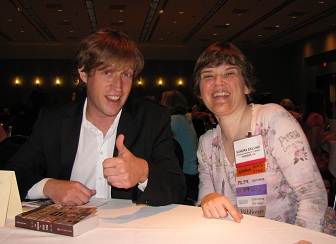 It’s time for Sonderling Sunday, loosely translated as “Nerdy Sonntag.” I hasten to add that you definitely do not need to be a German speaker to enjoy this series. Indeed, I wouldn’t really call myself a German speaker. This series is, quite simply, for people who love words. In it, I look at Der Orden der Seltsamen Sonderlinge and compare it with its original English version, The Order of Odd-Fish, by James Kennedy, to discover some bizarre and fun things about German and English and different ways of thinking about things and different combinations of wonderful sounds.
It’s time for Sonderling Sunday, loosely translated as “Nerdy Sonntag.” I hasten to add that you definitely do not need to be a German speaker to enjoy this series. Indeed, I wouldn’t really call myself a German speaker. This series is, quite simply, for people who love words. In it, I look at Der Orden der Seltsamen Sonderlinge and compare it with its original English version, The Order of Odd-Fish, by James Kennedy, to discover some bizarre and fun things about German and English and different ways of thinking about things and different combinations of wonderful sounds.
We are on Chapter Eight, which begins on page 65 in the English version and Seite 84 in the German. This is a long chapter, so I’m going to go straight to focusing on the most interesting sentences and phrases.
On the first page a fun one comes:
“Crashing into the ocean” = in den Ozean zu plumpsen
“pretty dull afterlife” = Ein ziemlich trübseliges Leben nach dem Tod (Google translates that as “a rather dreary life after death.”)
“The plane was destroyed, its hull torn and flooded with black, swirling seawater.” = Das Flugzeug war zerstört; der Rumpf war zerfetzt und von schäumendem schwarzem Meerwasser überflutet.
Just to clarify, here Rumpf is “hull”; zerfetzt is “torn,” and schäumendem is “swirling.”
This one is evocative:
“oily murk” = ölige Brühe (Be sure to put lots of “oo” and “ew” in those vowels.)
“floated” = herumdümpelten (“bobbed about”)
“waterlogged” = aufgeweichte (Google just translates this “softened.” Ewww.)
“soaked” = durchnässt (“through-wetted”)
“gash” = klaffenden Riss (“gaping cracks”)
“slimier” = irgendwie schleimiger und glitschiger (Google: “Somewhat slimier and slipperier” – I suspect we have a little elaboration here.)
I like this sentence. Perhaps some insight on where the word “wade” came from, not to mention “slimy”?
“Soon they were all wading in the slimy water.” = Kurz darauf wateten sie alle durch das schleimige Wasser.
Now, “slimy” sounds slimy. But schleimige?! You can almost feel it clinging to you.
“squishy” = matschig
More exquisite disgustingness:
“spilling juices” = aus denen Flüssigkeiten sickerten (“from which liquids leaked”)
For once the German is shorter:
“whoop of delight” = Jubelschrei (Now there’s a good name for a band.)
“treacherous goo” = verräterische Brühe
“rhapsodized” = schwärmte
Okay, say this a few times, just to savor the sounds:
“an enormous mucilaginous gorge” = eine gewaltige, schleimige Schlucht
(Has it struck you, like me, that English has more different words than German for the concept of “slimy”? But you have to give them that the one German word is really good.)
This paragraph is too fun in English not to mention:
“Wonders upon wonders!” said Colonel Korsakov. “I don’t recall eating a small law firm.”
Auf Deutsch:
»Wunder über Wunder!«, erklärte Oberst Korsakov. »Ich kann mich nicht erinnern, eine Anwaltskanzlei gegessen zu haben.«
“with a shiver” = dann fröstelnd ab
“Its crumbling bricks were crabbed with gray, sickly ivy, and cold thin mist twisted around.” = Die verfallenen Steine waren von krausem widerlichem Efeu überzogen und ein kalter, dünner Nebel wirbelte um das Haus.
“yellowed books” = vergilbten Büchern
“crumbling maps” = zerbröselnden Karten
“shattered chandelier” = zerborstener Kronleuchter (“burst crown-lights”)
“gangly” = schlaksig
Oh this is good:
“freckled” = Sommersprossen (“summer sprouts”)
Longest word candidate (19 letters):
“squinted at his visitors” = musterte seine Besucher aus zusammengekniffenen Augen (“looked at his visitors with together-narrowed eyes”)
“whimsical tomfoolery” = wunderlichen Albernheiten
“bony” = knorrige
“snug” = kuschelig Ah! “cushy”!
“puzzlement” = Verblüffung (I think I’ve mentioned this one before, but it’s so good.)
“jars” = Einmachgläsern
“floating” = schwammen
“stunned” = verblüfft
“violence” = Neigung zur Gewalttätigkeit (“inclination to violence”)
“questionable” = Fragwürdiges (“question worthy”)
This phrase is nice in German:
“Just the opposite” = Ganz in Gegenteil
A simple one that’s just fun to say:
“wondered” = nachgedacht (“thought after”)
Nice and alliterative:
“shook again” = erbebte erneut (“quaked anew”)
“Grunting, sweating, shouting” = Grunzend, schwitzend und brüllend
“sunset” = Sonnenuntergang (“sun downfall”)
“foaming river” = von Gischt schäumenden Fluss (“with spray foaming river”)
“booming and trumpeting” = mit viel Tamtam und Tschingderassa
“We would be run out of town.” = Wir würden geteert und gefedert aus der Stadt geworfen. (“We would be tarred and feathered and thrown out of the city.”)
“divert” = ablenken
“handlebar mustache” = Schnauzbart
“heave” = Kraftakt (“might act”)
“The applause outside was tremendous.” = Der Applaus war ohrenbetäubend. (“The applause was ear-numbing.”)
An even longer word, right at the end of the chapter:
“the screech of grinding metal, laughter and carousing” = das Kreischen von aneinanderschabendem Metall, Gelächter und Freudenschreie (“the screech of on-one-another-scraping metal, laughter and joy-cries”)
Very evocative:
“stuff myself” = mich vollzustopfen
And finally, even more “Sonder” than in the title:
“The Grand Feast of the Odd-Fish” = Das gro?e Fest der Sonderbaren Sonderlinge (“The grand feast of the “special” “special ones”.)
Summing up:
Longest word: aneinanderschabendem
Most improved translation: “an enormous mucilaginous gorge” = eine gewaltige, schleimige Schlucht
Most disgusting translation: Tie between schleimiger und glitschiger and ölige Brühe
Most onomatopoetic: plumpsen
Best name for a band: Jubelschrei
Best image: “freckles” = Sommersprossen
Most alliterative translation: Ganz in Gegenteil
Now then, wasn’t that fun? And a delightful way to spend my time in the 48-Hour Book Challenge. Definitely book-related. Tune in next week as we explore Das gro?e Fest der Sonderbaren Sonderlinge!